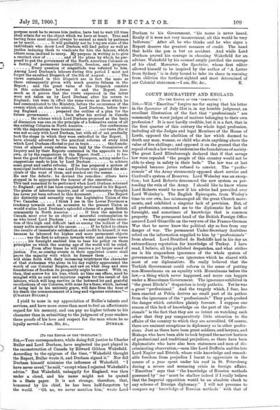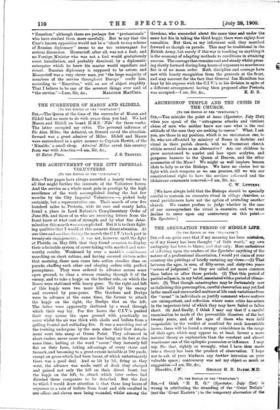COUNT MOURAVIEFF AND ENGLAND.
[To THE EDITOR OP THE "SPECTATOR."]
Snt,—Will "Emeritus" forgive me for saying that his letter in the Spectator of July 21st is, in my humble judgment, an excellent illustration of the fact that " professionals " are commonly the worst judges of matters belonging to their own profession ? It is now hardly credible, but it is a fact, that in the first quarter of this century the whole legal profession, including all the Judges and legal Members of the House of Lords, opposed the abolition of the law which doomed to death any man, woman, or child who stole anything above the value of five shillings ; and opposed it on the ground that the repeal of such a law would undermine the foundations of society. The great Lord Ellenborough declared that if that savage law were repealed "the people of this country would not be able to sleep in safety in their beds." The law was at last repealed because juries refused to convict. The "profes- sionals" of the Army strenuously opposed short service and Cardwell's system of Reserves. Lord Wolseley was an excep- tion; but Lord Roberts denounced the new system as por- tending the ruin of the Army. I should like to know where Lord Roberts would be now if his advice had prevailed over Lord Wolseley's. The English Episcopate, from Wesley's time to our own, has mismanaged all the great Church move- ments, and exhibited a singular lack of prevision. But, of all professions, commend me to the diplomatic for lack of foresight, and sometimes of knowledge that is common property. The permanent head of the British Foreign Office assured Lord Granville on the very eve of the Franco-German War that he never knew the political sky so free from any danger of war. The permanent Under-Secretary doubtless relied on the information supplied to him by "professionals" from abroad. Lord Stratford de Recleliffe had in his day an extraordinary reputation for knowledge of Turkey. I have read, I believe, all his published despatches, and what strikes me is his stupendous ignorance of the whole system of government in Turkey,—an ignorance which he shared with most of our diplomatists. He really believed that the Turkish Government could reform in the sense of putting non-Mussulmans on an equality with Mussulmans before the law,—a thing which never happened, and never can happen under a Mussulman Government. The ignorance exhibited in "the great Eltehrs" despatches is truly pathetic. Yet he was a great "professional." And the tragedy which, I fear, has been enacted at Pekin derives no small part of its pathos from the ignorance of the "professionals." They pooh-poohed the danger which outsiders plainly foresaw. I suppose one reason of this lack of knowledge on the part of the " profes- sionals " is the fact that they are so intent on watching each other that they pay comparatively little attention to the affairs of the country to which they are accredited. Of course, there are eminent exceptions in diplomacy as in other profes- sions. Just as there have been great soldiers, and lawyers, and Bishops who have been able to look beyond the narrow horizon of professional and traditional prejudices, so there have been diplomatists who have also been statesmen and men of dis- criminating observation,—men like Lord Dufferin and the late Lord Napier and Ettrick, whose wide knowledge and remark- able freedom from prejudice I learnt to appreciate in the course of a year spent under his roof in St. Petersburg during a severe and menacing crisis in foreign affairs. "Emeritus" says that "the knowledge of Russian methods possessed by me "must be shallow indeed if I really believe that the Imperial opposition would he an absolute check to any scheme of Russian diplomacy." I will not presume to compare my - knowledge of Russian methods with that of '‘ Emeritus," although there are perhaps few "professionals" who have studied them more carefully. But to say that the Czar's known opposition would not be a "check to any scheme of Russian diplomacy" seems to me too extravagant for serious discussion. Mouravieff, after all, was not a fool; and no Foreign Minister who was not a fool would gratuitously court humiliation, and probably dismissal, by a diplomatic enterprise which he knew his master would repudiate and resent. Russian diplomacy is supposed to be astute, and Mouravieff was a very clever man, yet "the large majority of members of the service throughout Europe" credit him, according to "Emeritus," with an act of abject stupidity. That I believe to be one of the severest things ever said of



































 Previous page
Previous page